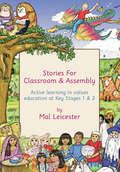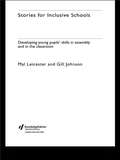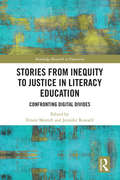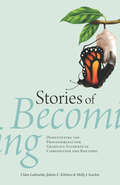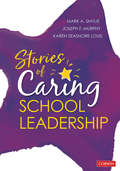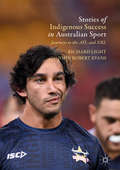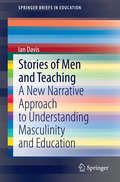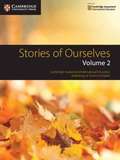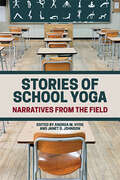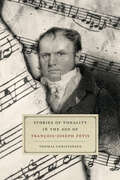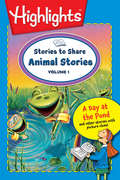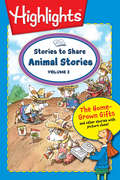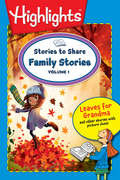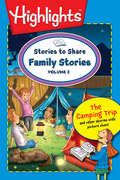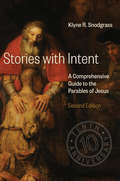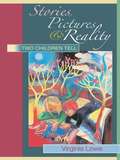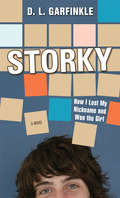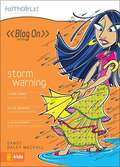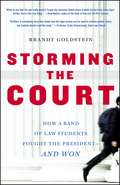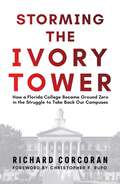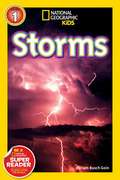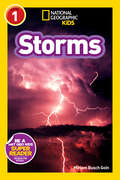- Table View
- List View
Stories for Classroom and Assembly: Active Learning in Values Education at Key Stages One and Two
by Mal LeicesterThis book is an indispensable resource for use in both the classroom and assembly, providing a delightful collection of fifteen original themed stories and activities, designed to develop key values and skills. Using the power of story, it stimulates reflection and discussion on a range of topics. The material is presented to maximise fun in learning, flexibility and coverage of National Curriculum guidelines for values education teaching. Amongst the key values discussed are: personal responsibility and independence co-operation and sharing honesty and justice respect for world religions. Each session contributes to key skills in English, whilst many of the activities involve use of co-ordination, numeracy and science skills. In addition, the stories are implicitly multicultural in flavour, giving a diverse and innovative feel to the book as a whole. An irresistibly charming, and yet practical tool, its topical tales and photocopiable resources make it an essential classroom companion.
Stories for Inclusive Schools: Developing Young Pupils' Skills
by Mal Leicester Gill JohnsonThis gem is the ideal companion for the busy primary school teacher. Packed with timesaving resources for both the classroom and assembly, it provides a wealth of activities to develop key values and skills in your pupils. Using the power of stories, the authors champion a fresh and inspiring approach to inclusive education across the curriculum, integrating key values into classroom learning. The twelve themed tales stimulate reflection and discussion on such sensitive areas as: bullying prejudice physical disability as well as 'hidden' disabilities alternative lifestyles, cultures, and different appearances parental difference. Lively characters of various ethnic origins, who embody respect for diversity, enhance these multicultural stories. In addition, each session contributes to key skills learning in English, including speaking and listening, reflecting, reasoning and concentrating. Many of the activities also integrate coordination and art and craft skills, numeracy and science skills. The many photocopiable activity pages make this an essential tool for teachers or heads who wish to ensure that inclusion is genuinely working for all children throughout their school.
Stories from Inequity to Justice in Literacy Education: Confronting Digital Divides (Routledge Research in Education)
by Jennifer Rowsell Ernest MorrellChallenging the assumption that access to technology is pervasive and globally balanced, this book explores the real and potential limitations placed on young people’s literacy education by their limited access to technology and digital resources. Drawing on research studies from around the globe, Stories from Inequity to Justice in Literacy Education identifies social, economic, racial, political and geographical factors which can limit populations’ access to technology, and outlines the negative impact this can have on literacy attainment. Reflecting macro, meso and micro inequities, chapters highlight complex issues surrounding the productive use of technology and the mobilization of multimodal texts for academic performance and illustrate how digital divides might be remedied to resolve inequities in learning environments and beyond. Contesting the digital divides which are implicitly embedded in aspects of everyday life and learning, this text will be of great interest to researchers and post-graduate academics in the field of literacy education.
Stories of Becoming: Demystifying the Professoriate for Graduate Students in Composition and Rhetoric
by Juliette C. Kitchens Claire Lutkewitte Molly J. ScanlonBased on findings from a multiyear, nationwide study of new faculty in the field of rhetoric and composition, Stories of Becoming provides graduate students—and those who train them—with specific strategies for preparing for a career in the professoriate. Through the use of stories, the authors invite readers to experience their collaborative research processes for conducting a nationwide survey, qualitative interviews, and textual analysis of professional documents. Using data from the study, the authors offer six specific strategies—including how to manage time, how to create a work/life balance, and how to collaborate with others—that readers can use to prepare for the composition and rhetoric job market and to begin their careers as full-time faculty members. Readers will learn about the possible responsibilities they may take on as new faculty, particularly those that go beyond teaching, research, service, and administration to include navigating the politics of higher education and negotiating professional identity construction. And they will also engage in activities and answer questions designed to deepen their understanding of the field and help them identify their own values and desired career trajectory. Stories of Becoming demystifies the professoriate, compares what current new faculty have to say of their job expectations with the realities that students might face when on the job, and brings to light the invisible, behind-the-scenes work done by new faculty. It will be invaluable to graduate students, those who teach graduate students, new faculty, and hiring administrators in composition and rhetoric.
Stories of Caring School Leadership
by Karen Seashore Louis Joseph F. Murphy Mark A. SmylieReal-life examples to inform and inspire caring in your leadership practices! The practice of caring is essential to effective schooling. Published as a companion to Caring School Leadership, this comprehensive resource of powerful, real-life stories will make clear the connection between caring leadership and student academic success and well-being. Stories of Caring School Leadership includes a guide for using the stories in self-directed reflection and learning, for educators practicing in schools and professional preparation programs. Readers will find stories that • will help aspiring and practicing leaders reflect upon and further develop caring as a quality of their leadership • affirm the importance of caring as a fundamental quality of school leadership • provide examples of caring school leadership in action that can be analyzed, reflected upon, and used to develop practice Stories have the power to inform and inspire. The stories in this book are evidence of what is possible when caring leadership is practiced in our schools.
Stories of Caring School Leadership
by Karen Seashore Louis Joseph F. Murphy Mark A. SmylieReal-life examples to inform and inspire caring in your leadership practices! The practice of caring is essential to effective schooling. Published as a companion to Caring School Leadership, this comprehensive resource of powerful, real-life stories will make clear the connection between caring leadership and student academic success and well-being. Stories of Caring School Leadership includes a guide for using the stories in self-directed reflection and learning, for educators practicing in schools and professional preparation programs. Readers will find stories that • will help aspiring and practicing leaders reflect upon and further develop caring as a quality of their leadership • affirm the importance of caring as a fundamental quality of school leadership • provide examples of caring school leadership in action that can be analyzed, reflected upon, and used to develop practice Stories have the power to inform and inspire. The stories in this book are evidence of what is possible when caring leadership is practiced in our schools.
Stories of Indigenous Success in Australian Sport: Journeys to the AFL and NRL
by Richard Light John Robert EvansThis book presents journeys of sixteen Indigenous Australian athletes from their first touch of a‘footy’ to the highest levels of Australian football and rugby league, conceptualized as a processof learning. The authors challenge simplistic explanations of Indigenous success in Australianfootball and rugby league, centered on the notion of the ‘natural athlete’. The book tracesthe development of Indigenous sporting expertise as a lifelong process of learning situated inlocal culture and shaped by the challenges of transitioning into professional sport. Individually,the life stories told by the participants provide fascinating insights into experience, cultureand learning. Collectively, they provide deep understanding of the powerful influence thatAboriginal culture exerted on the participants’ journeys to the top of their sports while locatingindividual experience and agency within larger economic, cultural and social considerations.Stories of Indigenous Success in Australian Sport will be of interest to students and scholarsacross a range of disciplines including Indigenous studies, physical education, education, sportmanagement and sociology
Stories of Men and Teaching
by Ian DavisThis book investigates the dynamic relationship between masculinity, fiction and teaching answering one central question. How are male teachers influenced by fictional narratives in the construction of masculinities within education? It achieves this in three major steps: by describing a methodological system of narrative analysis that is able to account for the influence of a fictional text alongside a reading of interview data, by focusing on a specific cohort of male teachers in order to measure the influence of a fictional text and the literary tropes they contain, both widening and restricting perceptions of teachers and teaching. The book demonstrates how fictional narratives and their encompassing ideologies can become a powerful force in the shaping of male teachers professional identities. The book focuses on a collection of 22 fictional narratives drawn from the teacher text genre. Each text describes the world of teachers and teaching from differing perspectives, in differing forms including, literary texts; dramatic works such as plays or musicals; feature films; and television and radio series. The teacher text is a popular and prolific genre. As part of the analysis the book pilots an innovative methodological process hat reconciles the structural and textual differences between fictional texts and interview data in an effort to find points of commonality and mutual influence. Stories of Men and Teaching reveals how teaching professionals utilise tropes found in fictional texts in chaotic and unstructured ways to manage points of professional intensity as they arise. Key features such as legacy, fear, belonging, reparation and violence are identified as themes that occupy male teachers most when considering their own identity and professional performance, and each is also represented in the fictional teacher text canon.
Stories of Ourselves Volume 2: Cambridge Assessment International Education Anthology of Stories in English (Cambridge International Examinations)
by Mary WilmerThis series contains poetry and prose anthologies composed of writers from across the English-speaking world. Stories of Ourselves Volume 2 is a set text for Cambridge IGCSE®, O Level and International AS & A Level Literature in English courses. The anthology contains short stories written in English by authors from many different countries and cultures, including Charles Dickens, Virginia Woolf, Christina Rossetti, Janet Frame, Jhumpa Lahiri, Romesh Gunesekera, Segun Afolabi, Margaret Atwood and many others. Classic writers appear alongside new voices from around the world in a stimulating collection with broad appeal.
Stories of School Yoga: Narratives from the Field
by Andrea M. Hyde; Janet D. JohnsonThe yoga-in-schools movement has been gaining momentum in recent years as adult practitioners realize the benefit of yoga in their personal lives and want to share it with children and youth. As the movement has grown, so has the need to understand how yoga works and its effects on individuals, groups, and school culture. Stories of School Yoga brings together firsthand narratives by teachers and practitioners from diverse settings nationwide to illuminate the multifaceted work, challenges, and benefits of teaching yoga to K−12 students in public schools. The stories here supplement and reframe quantitative research in the field; demonstrate how yoga can mitigate stress and tension, particularly amid an increased focus on standardized curricula and testing; and offer lessons learned and practical insights into planning, implementing, and running these programs. Rich in detail and accessible to nonspecialists, Stories of School Yoga presents helpful resources and a nuanced, on-the-ground look at the yoga-in-schools movement.
Stories of Tonality in the Age of François-Joseph Fétis
by Thomas ChristensenStories of Tonality in the Age of François-Joseph Fétis explores the concept of musical tonality through the writings of the Belgian musicologist François-Joseph Fétis (1784–1867), who was singularly responsible for theorizing and popularizing the term in the nineteenth century. Thomas Christensen weaves a rich story in which tonality emerges as a theoretical construct born of anxiety and alterity for Europeans during this time as they learned more about “other” musics and alternative tonal systems. Tonality became a central vortex in which French musicians thought—and argued—about a variety of musical repertoires, be they contemporary European musics of the stage, concert hall, or church, folk songs from the provinces, microtonal scale systems of Arabic and Indian music, or the medieval and Renaissance music whose notational traces were just beginning to be deciphered by scholars. Fétis’s influential writings offer insight into how tonality ingrained itself within nineteenth-century music discourse, and why it has continued to resonate with uncanny prescience throughout the musical upheavals of the twentieth and twenty-first centuries.
Stories of the Kingdom - eBook [ePub]
by LeeDell SticklerJesus was a great teacher. He always used examples of activities the people knew about in order to teach them what He wanted them to know. When Jesus talked about the "Kingdom of God," he used stories of people doing ordinary things to show His listeners what it meant to live in God's kingdom. Included in "Stories of the Kingdom" are four stories that will help children know how to live in God's kingdom: The Sower (hearing God's word and putting it into action), The Good Samaritan (loving your neighbor), The Lost Sheep (our importance to God), and The Forgiving Father (God's unconditional love for us).
Stories to Share: Animal Stories Volume 1
by Highlights For Children Dave Klug Kevin ZimmerRebus stories teach kids how to read independently. Key words in the stories are paired with images that allow young readers to decipher new words without help from grown-ups. This collection of rebus animal stories, along with its companion, Stories to Share: Animal Stories Volume 2, is perfect for young readers who love stories about animals.
Stories to Share: Animal Stories Volume 2
by Highlights For Children John Nez Dave KlugRebus stories teach kids how to read independently. Key words in the stories are paired with images that allow young readers to decipher new words without help from grown-ups. This collection of rebus animal stories, along with its companion, Stories to Share: Animal Stories Volume 1, is perfect for young readers who love stories about animals.
Stories to Share: Family Stories Volume 1
by Highlights For Children Dave Klug Alvarez LorenaRebus stories teach kids how to read independently. Key words in the stories are paired with images that allow young readers to decipher new words without help from grown-ups. This collection of rebus family stories, along with its companion, Stories to Share: Family Stories Volume 2, is perfect for young readers who love stories about family.
Stories to Share: Family Stories Volume 2
by Highlights For Children Richard Hoit Dave KlugRebus stories teach kids how to read independently. Key words in the stories are paired with images that allow young readers to decipher new words without help from grown-ups. This collection of rebus family stories, along with its companion, Stories to Share: Family Stories Volume 1, is perfect for young readers who love stories about family.
Stories with Intent: A Comprehensive Guide to the Parables of Jesus
by Klyne R. SnodgrassWinner of the 2009 Christianity Today Award for Biblical Studies, Stories with Intent offers pastors and students a comprehensive and accessible guide to Jesus' parables. Klyne Snodgrass explores in vivid detail the historical context in which these stories were told, the part they played in Jesus' overall message, and the ways in which they have been interpreted in the church and the academy. Snodgrass begins by surveying the primary issues in parables interpretation and providing an overview of other parables—often neglected in the discussion—from the Old Testament, Jewish writings, and the Greco-Roman world. He then groups the more important parables of Jesus thematically and offers a comprehensive treatment of each, exploring both background and significance for today. This tenth anniversary edition includes a substantial new chapter that surveys developments in the interpretation of parables since the book's original 2008 publication.
Stories with Intent: A Comprehensive Guide to the Parables of Jesus
by Klyne R. SnodgrassWinner of the 2009 Christianity Today Award for Biblical Studies, Stories with Intent offers pastors and students a comprehensive and accessible guide to Jesus' parables. Klyne Snodgrass explores in vivid detail the historical context in which these stories were told, the part they played in Jesus' overall message, and the ways in which they have been interpreted in the church and the academy. Snodgrass begins by surveying the primary issues in parables interpretation and providing an overview of other parables—often neglected in the discussion—from the Old Testament, Jewish writings, and the Greco-Roman world. He then groups the more important parables of Jesus thematically and offers a comprehensive treatment of each, exploring both background and significance for today. This tenth anniversary edition includes a substantial new chapter that surveys developments in the interpretation of parables since the book's original 2008 publication.
Stories, Pictures and Reality: Two Children Tell
by Virginia LoweStories, Pictures and Reality follows two children as they work out the reality status of stories and pictures, with a daily parent-observer record from the birth of the first child until the second is eight, a span of eleven years in all. Together these children pick through the meaning of stories and the motivations of the characters they discover in this unique first-hand description of the discernment that children bring to books from an early age, full of revealing quotes that tell us a great deal about the cognitive development of our young readers: "It’s a joke 'cause it couldn’t really have happened", "I’ll tell you what's pretend: Batman, Robin, Superman, pirates, cowboys and Indians". "Pussy cats don’t fly kites!", "The man who drawed it was wrong". In analysis this longitudinal study shows that children have more insight and understanding than they are often given credit for and that they approach subjects that puzzle the most sophisticated of thinkers with an elegant simplicity beyond the expectations of conventional psychologists and children’s literature commentators. This book urges readers, especially practitioners and academics, to afford greater respect to what young children are capable of in this area.
Storky: How I Lost My Nickname and Won the Girl
by D. L. GarfinkleThe journal of Michael "Storky" Pomerantz tells the tumultuous tale of life as a high-schooler--complete with the fact that the love of his life is dating a high school football player. <P><P>As he chronicles the highs--and, of course, the most embarrassing lows--of his freshman year in high school, Storky paints an amusing and oftentimes hilarious portrait of an average teenager. But Michael is a not-so-ordinary kid, with a wit and charm that is atypical of average teens, and you will soon be cheering for him to lose his nickname and win the girl.
Storm Warning (Faithgirlz! Blog On #8)
by Dandi Daley MackallStorm Novelo can't understand why she's messing up more now than before she became a Christian. Believing she's at least partly to blame for her dad's depression, Storm determines to make him proud by joining the Quiz Bowl team, a move that pits her against Cameron Worthington the Third and teammates who'll do everything they can to see her fail.
Storming the Court: How a Band of Yale Law Students Sued the President--and Won
by Brandt GoldsteinThe David vs. Goliath story of the unflagging Yale Law School students who in 1992 fought the U.S. Government all the way to the Supreme Court.In 1992, three hundred innocent Haitian men, women, and children who had qualified for political asylum in the United States were detained at Guantánamo Bay, Cuba—and told they might never be freed. Charismatic democracy activist Yvonne Pascal and her fellow refugees had no contact with the outside world, no lawyers, and no hope...until a group of inspired Yale Law School students vowed to free them. Pitting the students and their untested professor Harold Koh against Kenneth Starr, the Justice Department, the Pentagon, and Presidents George H. W. Bush and Bill Clinton, this real-life legal thriller takes the reader from the halls of Yale and the federal courts of New York to the slums of Port-au-Prince and the windswept hills of Guantánamo Bay and ultimately to the U.S. Supreme Court. Written with grace and passion, Storming the Court captures the emotional highs and despairing lows of a legal education like no other—a high-stakes courtroom campaign against the White House in the name of the greatest of American values: freedom.
Storming the Ivory Tower: How a Florida College Became Ground Zero in the Struggle to Take Back Our Campuses
by Richard CorcoranA firsthand account of how Richard Corcoran, former education commissioner of Florida, successfully took on powerful progressive interest groups, broke their monopoly, and paved the way for higher education reform across America.Covid alerted the nation to the reality that K-12 schools—private and public alike—were infested with ideologues bent on indoctrinating children. Then, three years after the beginning of the pandemic, the shocking response to Hamas&’s genocidal assault on Israel made Americans aware that the same tumor had wholly sickened our country&’s colleges and universities. Now, conservatives—and increasingly, moderates and old-school liberals—want to know exactly how the radical left captured higher education. Florida has been the vanguard in the war to restore sanity to higher education. And Richard Corcoran has been one of its commanding generals—and racking up wins. When Corcoran was Florida&’s education commissioner, he was the point person for reopening schools and banning mask mandates. He triumphed. Then, he was given a herculean task: remaking a college overrun by radicalism and cancel culture. In 2023, he moved into the president&’s office in Sarasota, took on a campus mob, and challenged a media firestorm. Just a year later, Corcoran achieved the seemingly impossible. He turned around New College of Florida. Now, free speech is protected. Violence and anti-Semitism are abolished. DEI bureaucracy is eliminated. And, already, enrollment records are being broken. Storming the Ivory Tower is the story of how Corcoran is winning the fight for freedom in hostile territory, and how others can join the battle.
Storms (National Geographic Kids Readers #Level 1)
by National Geographic Kids Staff Miriam GoinIn a haboob, camels shut a second pair of eyelids to protect their eyes from sand. Their long, thin nostrils and extra hairy ears keep sand out. In monsoon rains, some monkeys keep dry in buildings or under branches. Other monkeys don't mind getting wet.
Storms (Readers)
by Miriam Busch GoinStorms are SCARY! But it&’s cool to understand what&’s going on when Mother Nature gets angry. Why does the wind howl? Why does it rain for days? How do rivers overflow? Thunder and lightening, monsoons, hurricanes, tornadoes... the facts and photos in this book will blow you away!
